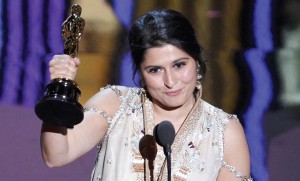Washington Post
Ishaan Tharoor
 When “A Girl in the River: The Price of Forgiveness” won the 2016 Oscar for best short-subject documentary, the film and its director, Pakistani-born Sharmeen Obaid-Chinoy, were understandably feted on social media. Obaid-Chinoy’s victory was seen as a triumph for women, South Asia and the power of cinema.
When “A Girl in the River: The Price of Forgiveness” won the 2016 Oscar for best short-subject documentary, the film and its director, Pakistani-born Sharmeen Obaid-Chinoy, were understandably feted on social media. Obaid-Chinoy’s victory was seen as a triumph for women, South Asia and the power of cinema.
The documentary details the harrowing story of a young woman in Pakistan, Saba Qaiser, who was shot in the head and left for dead at the side of a river by her father in 2014. The act was an attempted “honor killing,” with Saba’s father apparently irate at his daughter’s decision to marry someone not approved by him.
The teenager survived and went on to seek justice, a quest captured by Obaid-Chinoy’s documentary. The film reveals a grim and tragically widespread culture of abuse and misogyny in Pakistan. In rural parts of the country, as well as elsewhere in South Asia, honor killings and other acts of violence against women are all too commonplace. The Pakistani government estimates that about 500 women were victims of “honor killings” last year, though many activists believe the real number is far higher. The tale of Saba’s ordeal, though, has moved Pakistan into action. After the film’s victory at the Oscars, Pakistani Prime Minister Nawaz Sharif hailed its director.
“Women like Ms Sharmeen Obaid-Chinoy are not only a pride for the Pakistani nation but are also a significant source of contribution toward the march of civilization the world over,” he said.Sharif also vowed to push through further legislation against the practice of honor killings, which are already outlawed but endure because of religious mores as well as legal loopholes that pardon assailants who are “forgiven” by survivors. The Pakistani leader insisted that “there is no place for killing in the name of honor.”
In a phone call with WorldViews the day after her victory, Obaid-Chinoy expressed satisfaction that her work had led to the prospect of genuine political reform. “For a social justice documentary filmmaker, it’s a dream come true,” she said. “You have a sitting prime minister who’s making bold gestures.”
Obaid-Chinoy earlier won an Oscar for her 2012 documentary, “Saving Face,” about the prevalence of acid attacks against women in Pakistan.
Unfortunately, it takes much more than tough legislation to change ingrained traditions in often remote and underdeveloped parts of the country. In a 2013 Pew poll of Pakistanis, 84 percent of respondents expressed support for Islamic religious law and, of that number, a vast majority favored stoning as a punishment for adultery.
“We need to make examples of people,” Obaid-Chinoy said. “Some people still don’t think that killing a woman in the name of honor is actually a crime.” She hopes that with political leadership and greater education, more mindsets will change.
Still, if there was any need for evidence of the ideological obstacles along the way, the news in Pakistan on Monday offered a good glimpse. Authorities finally executed the assassin of Salman Taseer, a prominent liberal politician who was killed in 2011 for his opposition to the country’s controversial blasphemy laws.
The execution sparked nationwide protests, with Islamists taking to the streets and chanting the name of Taseer’s murderer.



